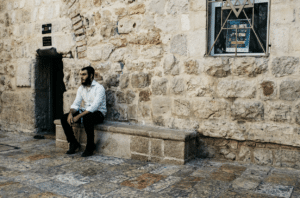Psalm 23 is well known and well loved. And with good reason. There are a few words in Hebrew however, which don’t come through in their fulness when expressed in English. I’d like to tell you a bit about what I see in those words.
א מִזְמוֹר לְדָוִד: יְהוָה רֹעִי, לֹא אֶחְסָר.
First of all, the song is written by King David, who changed career from being a shepherd to a king, with a good few years as a wandering fugitive in between. David’s life was in constant danger as the previous king, Saul, burned with envy against him and wanted him dead. David was a wanted man on the run, ducking and diving through the Judean hills and deserts, in search of escape, and safety. So that’s the important context. The first two Hebrew words sum this up: “Mizmor l’David” – a psalm (song) of David.
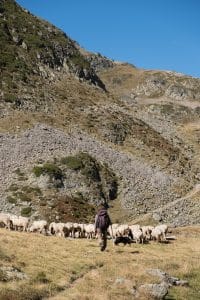 The next two words tell us that the Lord, YHWH, is his shepherd. The Lord’s name there is very profound and unique, yet here we see this awesome God, the One who just “IS” and who called all existence into being, is David’s shepherd. David understood that role well, and knew what it meant. He knew how he used to feel about the sheep in his care, and the lengths he would go to for them. More than that, the Hebrew word for shepherd shares a root with the word for companion, or close friend. This is also in the name of Ruth, who refused to leave her mother in law, Naomi. The Lord is my shepherd, “Adonai Roh-i”, are powerful words.
The next two words tell us that the Lord, YHWH, is his shepherd. The Lord’s name there is very profound and unique, yet here we see this awesome God, the One who just “IS” and who called all existence into being, is David’s shepherd. David understood that role well, and knew what it meant. He knew how he used to feel about the sheep in his care, and the lengths he would go to for them. More than that, the Hebrew word for shepherd shares a root with the word for companion, or close friend. This is also in the name of Ruth, who refused to leave her mother in law, Naomi. The Lord is my shepherd, “Adonai Roh-i”, are powerful words.
The next two words (לֹא אֶחְסָר) can easily be misunderstood when translated into English: “I shall not want”. I heard someone talking about how wonderful it was to not want anything, to be free of desire. But that’s more like Buddhism. It’s not what the Bible means.
In Buddhism there’s a value on getting rid of all desires, so that you don’t mind the suffering so much. ‘Don’t expect anything and you won’t be disappointed’ type philosophy. But the God of Israel does not encourage such thinking. He created us to experience desires and passions. We experience the fullness of life, the good and the bad, the highs and the lows. The challenge is to deal well with with our desires, our passions, and our wants, to submit them to God in the right way. Rather than saying we’ll be free from desires, the Hebrew here refers to lack: I shall not lack anything. I shall not be in want. This is a promise of God’s provision—He gives us what we need, rather than taking away our desires. He works with us, in our hopes, dreams and longings… not to say we get all we want, but we will not lack anything, even as we seek God for the desires of our hearts. David was in danger, wanting safety—and sometimes food and water—yet God provided for him and protected him through it all, and ultimately gave him a life far greater than his wildest dreams. Whatever happens in the future, good or bad, God will be there to look after me. I shall not lack anything—“lo achsar” (לֹא אֶחְסָר).
ב בִּנְאוֹת דֶּשֶׁא, יַרְבִּיצֵנִי; עַל-מֵי מְנֻחוֹת יְנַהֲלֵנִי.
The next verse of Psalm 23 has two phrases with lovely meanings—pleasantness, restoration and comfort. It says in pleasant grass or pastures he causes me to stretch out and lie down. (He makes me lie down in green pastures – ESV). The word translated as green has connotations of pleasantness, loveliness, something to be enjoyed. The idea of being “made” to lie down can sound a bit harsh or controlling, but it’s just the Hebrew verb structure in which cause is involved, not necessarily with compulsion.
Saying that our Good Shepherd “lays us down” is similar to the idea that He invites us to lay down in lovely places, just as we might say a waiter “seats us” at a table.
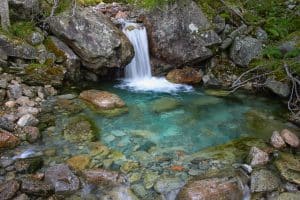 The next phrase says that He leads us beside restful waters (He leads me beside still waters – ESV). The word translated “still” has the Hebrew word for “comfort” in it, so restful, comforting waters. It reminds me of Isaiah 8 and the gently flowing waters of Siloam (v.6). God’s good intentions for us, wishing us good, not evil, come through powerfully. This is the context of Isaiah 8:6, where God is saying He wanted gently flowing waters of Siloam for His people, but that they refused. This also brings to mind the heart of Jesus is looking over Jerusalem at the end of Matthew 23, when He wished to gather them under His wings, as a mother hen gathers her chicks. It’s a powerful metaphor of a mother’s love. But they would not have it. So we are invited to lay down and rest, we are led by restful waters, and it’s a good idea to take God up on His offer of the good He invites us into.
The next phrase says that He leads us beside restful waters (He leads me beside still waters – ESV). The word translated “still” has the Hebrew word for “comfort” in it, so restful, comforting waters. It reminds me of Isaiah 8 and the gently flowing waters of Siloam (v.6). God’s good intentions for us, wishing us good, not evil, come through powerfully. This is the context of Isaiah 8:6, where God is saying He wanted gently flowing waters of Siloam for His people, but that they refused. This also brings to mind the heart of Jesus is looking over Jerusalem at the end of Matthew 23, when He wished to gather them under His wings, as a mother hen gathers her chicks. It’s a powerful metaphor of a mother’s love. But they would not have it. So we are invited to lay down and rest, we are led by restful waters, and it’s a good idea to take God up on His offer of the good He invites us into.
ג נַפְשִׁי יְשׁוֹבֵב; יַנְחֵנִי בְמַעְגְּלֵי-צֶדֶק, לְמַעַן שְׁמוֹ.
Next verse starts with the words, “He restores my soul”, or my soul comes back to me. You might ask where David’s soul had gone, that it would have to return! But we can say in English, “I feel like myself again” perhaps after recovering from a period of great stress, or illness. There is a Jewish prayer that is said upon waking: “I offer thanks before You, living and eternal King, for You have mercifully restored my soul within me; great is Your faithfulness.” However, this is a different Hebrew word for “restore” (הֶחֱזַרְ). This prayer was devised in the sixteenth century when the idea of reincarnation of souls entered Jewish thinking, and is based on the idea that your soul leaves your body when you sleep and God returns it to you when you wake. There is no biblical basis for this at all – in fact, quite the opposite (see Hebrews 9:27). The word in the Psalm here is different (יְשׁוֹבֵ֑ב) and has connotations of something going around. This makes more sense in light of the next phrase…
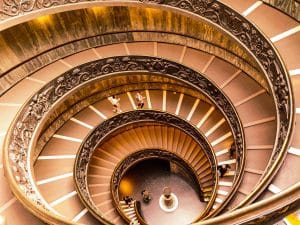 In English it reads, “He leads me in paths of righteousness for his name’s sake” – ESV). However, the word for paths is very unusual.
In English it reads, “He leads me in paths of righteousness for his name’s sake” – ESV). However, the word for paths is very unusual.
There are many different Hebrew words to choose from if you want to talk about paths or roads, but David chose a Hebrew word that means circle (מעגל). It looks, in some ways, as if he says God is leading him round in circles! But there is some profound truth in this.
I don’t know if you’ve noticed but many times in life, things seem familiar, as if you’re going round in circles. Patterns repeat. If we are walking with God, under His care and supervision, we are going up in a spiral of growth. Sure, you might think you’re back in the same place sometimes, but you’re not. You’re up a level. The view looks familiar, but you’ve grown.
Sometimes God has to take us several times round the block in order for us to learn something He’s trying to teach us, and other times we observe life cycling to bring closure and completion to unresolved issues. The Hebrew says that God leads us in circles, or cycles of righteousness, for His name’s sake. He is committed to our growth, and our journey with Him, so that He gets the glory. He wants us to grow in righteousness as He gradually conforms us to the likeness of His Son, from one degree of glory to the next, for His name’s sake.
ד גַּם כִּי-אֵלֵךְ בְּגֵיא צַלְמָוֶת, לֹא-אִירָא רָע– כִּי-אַתָּה עִמָּדִי;
The phrase “the valley of the shadow of death” is a poetic phrase, mentioned in other places as well as Psalm 23, and is talking about total blackness. The kind of pitch black where you can’t even see your hand in front of your face. According to biblical scholar, Carissa Quinn, Psalm 23 is a Messianic Psalm, parallel to Psalm 16 in which David writes, “For you will not abandon my soul to Sheol, or let your holy one see corruption” (v.10)2. This valley of the shadow of death is like Sheol, the grave. It must be passed through before coming out the other side, into resurrection. But just as Jesus knew where He had come from and where He was going, just as He was able to endure the cross, for the joy set before Him, so we too can take great encouragement in the face of suffering and even death. Even there, we do not need to fear. If we are in the Messiah, we have eternal life and nothing can take it away. We are, in fact, indestructible! We will live forever with our Good Shepherd, the One who cares so much for our souls that He died in our place—and gained victory over death. We need not fear for He is with us. In fact, David suddenly shifts from talking about God here at this central point of the psalm, apparently becoming aware of God’s presence as he starts talking to God directly: “YOU are with me”.
שִׁבְטְךָ וּמִשְׁעַנְתֶּךָ, הֵמָּה יְנַחֲמֻנִי.
“Your rod and your staff they comfort me”… You might be forgiven for thinking that sticks and rods don’t sound very comforting, but wait! They speak of authority and discipline, yes, but when in the right hands, there is great comfort to be found. Meditating on the sovereignty of our good God in lawless times like these brings great relief to the anxious soul. Our God reigns! The word for rod (שבט) is translated as scepter, and signifies our Good Shepherd’s right to rule—He is King. It appears in this key messianic prophecy given to the tribe of Judah:
The scepter [שבט] shall not depart from Judah,
nor the ruler’s staff from between his feet,
until tribute comes to him;
and to him shall be the obedience of the peoples. (Genesis 49:10)
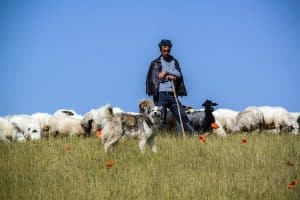 Similarly, there is comfort even in the Lord’s discipline, as it confirms that we are truly His children.
Similarly, there is comfort even in the Lord’s discipline, as it confirms that we are truly His children.
“My son, do not regard lightly the discipline of the Lord,
nor be weary when reproved by him.
For the Lord disciplines the one he loves,
and chastises every son whom he receives.” (Hebrews 12:5-6)
He will not, as some fear, just let us wander off and shrug His shoulders any more than a shepherd would his sheep. Trust me, I’ve tried! Of course God does respect our free will but He cares for our souls and there is great comfort in knowing that He is willing to reprove and discipline us to keep us on track.
ה תַּעֲרֹךְ לְפָנַי, שֻׁלְחָן– נֶגֶד צֹרְרָי;
 “You prepare a table before me in the presence of my enemies”… God is not only our provider, giving us what we need to survive, but He is a generous God, lavishing His love on us. Rather than leaving a food package by the door, He’s set the table and laid out a feast. It’s all ready, and prepared for us. This speaks of honor, and of rest. We are invited to come and sit at the table, to tarry, spending time in fellowship together with Him rather than grabbing a bite to eat on the go. In Jewish thought the table is like an altar, like with the showbread in the temple. It’s a point of meeting with God. Moreover, God gives us this V.I.P. treatment in front of our enemies. We can sit and relax at the banquet table under His protection, while the enemy can only look on. David is noting the great contrast between the destiny of the righteous and the unrighteous, His people and His enemies. The wicked are excluded from the great banquet, yet they have to look on and can only gnash their teeth as God rolls out the red carpet for His loved ones.
“You prepare a table before me in the presence of my enemies”… God is not only our provider, giving us what we need to survive, but He is a generous God, lavishing His love on us. Rather than leaving a food package by the door, He’s set the table and laid out a feast. It’s all ready, and prepared for us. This speaks of honor, and of rest. We are invited to come and sit at the table, to tarry, spending time in fellowship together with Him rather than grabbing a bite to eat on the go. In Jewish thought the table is like an altar, like with the showbread in the temple. It’s a point of meeting with God. Moreover, God gives us this V.I.P. treatment in front of our enemies. We can sit and relax at the banquet table under His protection, while the enemy can only look on. David is noting the great contrast between the destiny of the righteous and the unrighteous, His people and His enemies. The wicked are excluded from the great banquet, yet they have to look on and can only gnash their teeth as God rolls out the red carpet for His loved ones.
דִּשַּׁנְתָּ בַשֶּׁמֶן רֹאשִׁי, כּוֹסִי רְוָיָה.
“You anoint my head with oil”… David was literally anointed on his head with oil by the prophet Samuel, who had been sent by God. David was chosen and favored by God. He was destined to be king, with God’s sanction and approval. The word “messiah” means anointed one, one anointed for a purpose. However, despite the fact that this is a messianic psalm, a different Hebrew word used in this case (דשן instead of משח). Instead, it sounds like the Hebrew word for grass, in keeping with the theme of green pastures, and is often used of the fat / oil found in the ashes after burnt sacrifices elsewhere in Scripture.3 Given that Psalm 23 follows the pivotal Psalm 22 which describes, almost blow for blow, the suffering and crucifixion of the Messiah and His sacrifice for us, it could be that an allusion to the oil of the post-sacrificial ashes is quite fitting. David, another anointed one, also suffered greatly in different ways as the Psalms fully testify. He was chosen for a purpose and a destiny that was not easy. But he enjoyed the favor of God, and reveled in that chosenness.
 The next phrase is “my cup overflows”. The idea of the cup also features in our parallel psalm: “The Lord is my chosen portion and my cup” (Psalm 16:5a). In Psalm 23 David is talking about his great satisfaction with all God has given him, to the point of overflowing. He is delighted with God’s kind and abundant provision for his life. Again, David’s life wasn’t easy. He had a high calling with a high cost, but he was delighted with the amazing life God had given to him. The idea of the cup also reminds us of Jesus talking about the cup of suffering He had to drink (Matthew 10:22), the new covenant in His blood, as well as the promise of drinking wine anew in the kingdom of God (Matthew 26:29). Both oil and wine are made through crushing, but produce such good results. This overflowing cup speaks of the calling, the challenge, and the blessing that God gives us in this life and the next—that which is apportioned to us. It’s not just satisfying, but abundantly overflowing!
The next phrase is “my cup overflows”. The idea of the cup also features in our parallel psalm: “The Lord is my chosen portion and my cup” (Psalm 16:5a). In Psalm 23 David is talking about his great satisfaction with all God has given him, to the point of overflowing. He is delighted with God’s kind and abundant provision for his life. Again, David’s life wasn’t easy. He had a high calling with a high cost, but he was delighted with the amazing life God had given to him. The idea of the cup also reminds us of Jesus talking about the cup of suffering He had to drink (Matthew 10:22), the new covenant in His blood, as well as the promise of drinking wine anew in the kingdom of God (Matthew 26:29). Both oil and wine are made through crushing, but produce such good results. This overflowing cup speaks of the calling, the challenge, and the blessing that God gives us in this life and the next—that which is apportioned to us. It’s not just satisfying, but abundantly overflowing!
ו אַךְ, טוֹב וָחֶסֶד יִרְדְּפוּנִי– כָּל-יְמֵי חַיָּי;
“Surely goodness and mercy shall follow me all the days of my life”, writes David. Except it doesn’t really say they will follow me… more like goodness and mercy will chase me—they will hunt me down. The root word used is the same for persecution even—so it’s saying that goodness and mercy, or loving kindness (חֶסֶד – chesed) will chase me down… and with considerable enthusiasm! Not just meandering behind, dragging along somewhere in the background, but passionately pursuing with a high level of determination. It’s a great picture isn’t it? We can often feel like we’re plagued by troubles and that difficulties seem to follow us around, but Psalm 23 here says the opposite. For those in God’s flock, under the care of the Good Shepherd, it’s goodness and mercy that’s doing the hounding, eager to capture us and surround us with good things. And not just for a short period, but David expresses faith that it will continue throughout his entire future: all the days of his life. We can also have that same expectation. God is the same, yesterday, today and forever. He’s there in our futures too, waiting to chase us some more with his goodness and love. Weeping may come at night, but joy catches up with us in the morning.
וְשַׁבְתִּי בְּבֵית-יְהוָה, לְאֹרֶךְ יָמִים.
“…And I shall dwell in the house of the Lord forever.” Here when it is translated “I will dwell”, it’s more like “I will sit”. Like sitting at the table laid with a feast again. It speaks of rest, and of belonging. Given that so much of the theme in this collection of Psalms is messianic, it fits that Jesus is described as being sat down at the right hand of the Father (Hebrews 1:3, 12:2). His work is done, it is finished, and now He can sit down. He rose to greet Stephen while he was being martyred (Acts 7:55-56), and perhaps He stands for all the saints murdered for standing for their faith, but in general He is seated in the highest place of honor. David also sees his destiny as sitting down in the house of God. In Hebrew the house of God means the temple, but this concept is wide-ranging throughout the Bible. Essentially, David knows he will dwell with God in God’s dwelling place for the rest of his days. No one will ever ask him to leave. No wonder he’s so happy with his lot. Despite all the danger and trouble he experienced, David knew God as his shepherd who would always take great care of him forever.
- For further explanation on the significance of superscriptions in the Psalms, see this chapter in the Moody Handbook of Messianic Prophecy by Dr. Seth Postell: Messianism in the Psalms
- Carissa Quinn, Toward the Kingdom: The Shape and Message of Psalms 15-24 “An analysis of distinctive elements reveals that Psalms 16 and 23 are most closely related to one another, especially with regard to their corresponding and distinctive themes, structures, lexemes, and phrases. Both Psalms 16 and 23 can be classified in genre and theme as songs of trust.” (p.13)
- Exodus 27:3, Numbers 4:13 for example, Exodus 27:3 being the key “first mention”.
Photo by Jaka Škrlep on Unsplash












